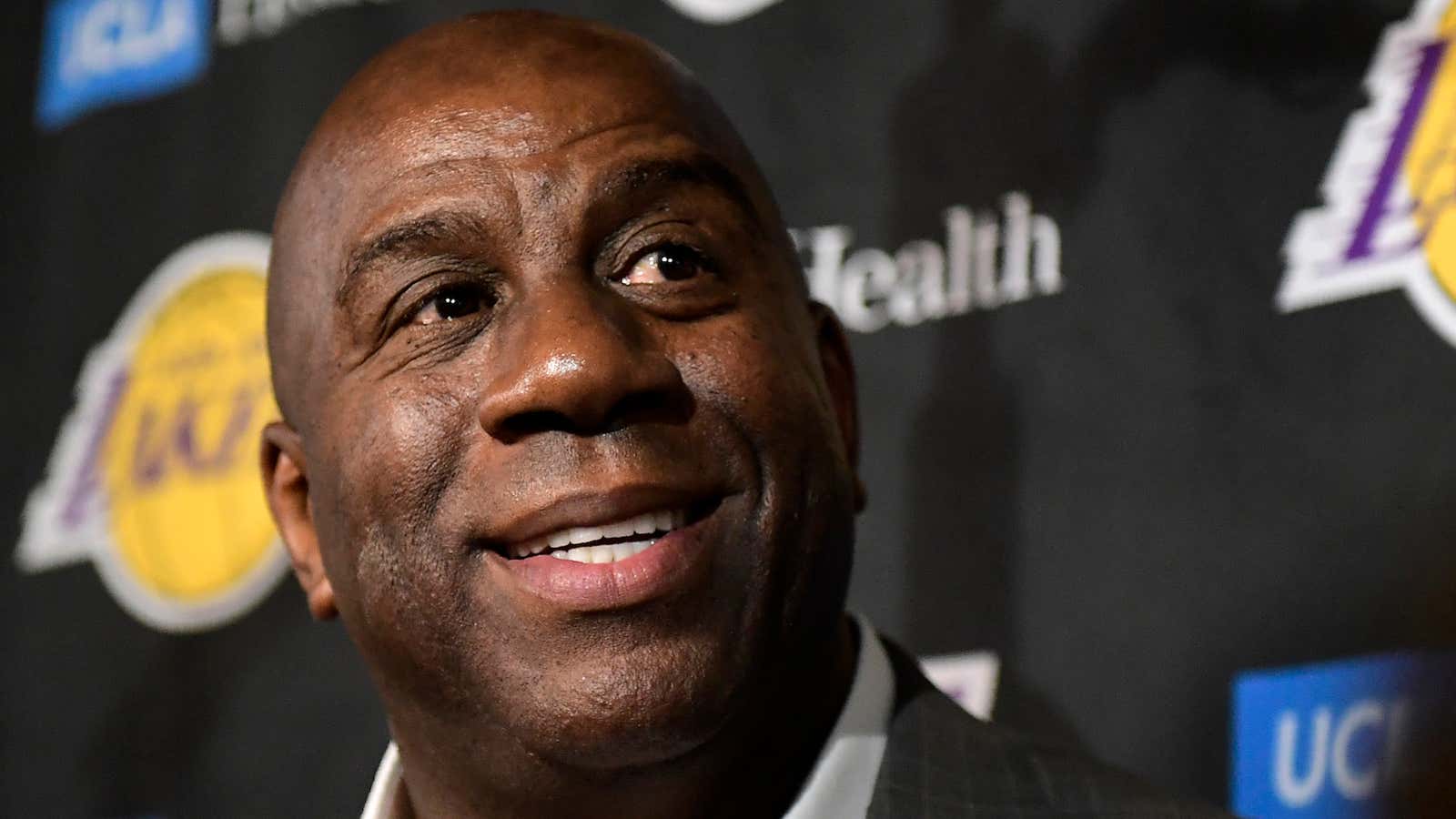Magic Johnson didn’t like being the boss—so he decided to quit his job. That’s smart!
Then he quit without giving notice to his boss, because he didn’t want to feel like he was letting her down. That’s … relatable, if not exemplary.
The legendary NBA player announced at a press conference yesterday that he was stepping down immediately as the Los Angeles Lakers’ president of basketball operations, a position he’s held since March 2017. “I think that I had more fun when I was able to be the big brother and ambassador to everybody,” he said, referring to the constrictions that came with his role as president.
Johnson has repeatedly gotten himself and the Lakers into hot water because of his penchant for complimenting and chatting with stars of other NBA teams, including Ben Simmons of the Philadelphia 76ers and the Milwaukee Bucks’ Giannis Antetokounmpo.
Stepping into a leadership role often means that people need to alter their behavior and relationships with others. Work advice columnist Alison Green has written that managers “should see setting appropriate boundaries with the people who work for them as just as much a part of the job as, say, delegating responsibilities or giving feedback.”
For Johnson, it seems, the tradeoff between setting NBA-appropriate boundaries and his ability to mentor and cheer on young players across all teams wasn’t worth it. “You have to think about where you are in life and what’s important to you,” he said, “and what’s important to me is I get to help everybody.”
Another factor in Johnson’s resignation? Like many bosses, he didn’t like the idea of having to fire someone. “Tomorrow I would have to affect someone’s livelihood and their life,” he said at the press conference. “I thought, that’s not fun for me, that’s not who I am.” Johnson was referring to Lakers coach Luke Walton, who was already expecting the axe to drop, according to ESPN’s Adrian Wojnarowski. Johnson’s departure means that Walton has a better chance of staying put, at least for now.
Johnson is far from alone in his desire to avoid being top banana. A 2014 CareerBuilder survey of 3,625 full-time US workers found that just one-third of respondents were interested in landing a leadership role, and only 7% had a desire to make it to the C-suite. For those who do find themselves in a managerial role, it’s common to feel that the pitfalls, from longer hours to being responsible for others’ working lives, outweigh the benefits. “Disliking being in charge is actually more common than liking it,” Devora Zack, head of Only Connect Consulting, told Fortune in 2012.
Johnson had nothing but warm words for his own boss, Lakers owner Jeanie Buss, saying, “Her and I have such an amazing relationship and I think that she gave me full power to do what I wanted to do.” Interestingly, his respect for, and friendship with, Buss—whom he referred to as his “sister”—seemed to play a direct role in his move to step down without telling her beforehand.
“Somebody’s gonna have to tell my boss, cause I know she’s gonna be sick, but I knew I couldn’t face her face-to-face and tell her,” he said. Johnson added that only the day before, his decision to leave the Lakers already made, he had sat on the information during a three-hour meeting with Buss about the future of the team. “I couldn’t stand to tell her.”
Under certain circumstances, workplace experts say that there are valid reasons not to give notice—if you’re in an abusive work environment and you’re worried about retaliation, say, or if you’re concerned that your new job offer may be rescinded at the last minute, leaving you high and dry. But feeling guilty about disappointing your boss doesn’t typically make the cut.
Fortunately for Johnson, Buss’s public response to the news suggests their relationship remains intact.
While Johnson’s method of quitting leaves something to be desired, given that he’s one of the most famous and talented NBA players in history, it’s unlikely to harm his future job prospects. And the good news is that he’s now free to live the life that’s right for him. As he said, “I had more fun on the other side than this side.”
